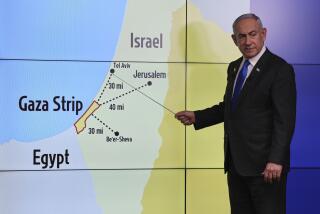Arafat’s Qualified Nod to U.S. Plan Paves Way for Talks
WASHINGTON — Palestinian Authority President Yasser Arafat accepted with “reservations” President Clinton’s outline of a final Israeli-Palestinian settlement Wednesday, clearing the way for intense diplomacy during the final 17 days of Clinton’s term.
“Both sides have now accepted the president’s ideas with some reservations,” White House Press Secretary Jake Siewert said. “That represents a step forward.”
In Jerusalem, Israel dispatched a mid-level negotiator, Gilead Sher, to Washington for talks today with U.S. mediators Dennis B. Ross and Aaron Miller. U.S. officials said Palestinian negotiators will begin similar meetings soon.
But there are no plans yet for face-to-face talks between Israeli and Palestinian bargainers, much less the sort of summit talks that would be required to complete a comprehensive treaty to end the half-century-old conflict.
Siewert and other Clinton administration officials acknowledged that a final settlement is still very much a long shot, especially with the president leaving office Jan. 20.
Siewert said President-elect George W. Bush’s foreign policy strategists “have been fully briefed on the progress of our talks.” But Middle East experts said it is very unlikely that the incoming administration could pick up the Clinton initiative, even if it wanted to.
Bush said Tuesday that Clinton “is giving it the very best shot he can, and I certainly hope it works.” But neither Bush nor anyone on his transition team has suggested that the new administration would be prepared to take over Clinton’s plan without a complete review of the situation.
Officials said Secretary of State Madeleine Albright, White House National Security Advisor Samuel R. “Sandy” Berger and Ross have briefed Secretary of State-designate Colin L. Powell and a small team of aides.
Siewert said Arafat accepted the Clinton outline in a telephone conversation Wednesday, after 3 1/2 hours of face-to-face talks at the White House the day before. Before calling Arafat, Clinton spoke by phone with caretaker Israeli Prime Minister Ehud Barak. The president telephoned Barak a second time after talking to Arafat.
Having accepted the U.S. proposal last week, Barak had been backtracking under mounting Israeli criticism of the plan, and Arafat’s belated and qualified embrace of the proposal Wednesday took Israeli officials by surprise. It set off intense debate among Barak’s “peace Cabinet” of foreign policy advisors, with some urging the Israeli leader to hang tough and others saying he had no choice but to return to the negotiating table.
Israeli state television said the advisors chose the negotiating path after Barak gained assurances from Clinton that Arafat would order a halt to the 3-month-old Palestinian uprising by this weekend.
Clinton had set acceptance by both sides of his proposal--really a set of general principles rather than a detailed plan--as the minimum condition for continuing his peace effort. That barrier has now been passed, but the way forward is extremely murky. Had Arafat rejected the U.S. initiative, the process would have been dead, at least for the time being. As it is, the process is alive--but on life support.
Hassan Abdel Rahman, chief of the Palestine Liberation Organization in Washington, confirmed Arafat’s qualified acceptance of the Clinton plan. Neither he nor White House officials would spell out what those reservations are.
Clinton said his plan was drawn from the competing positions advanced by Barak and Arafat at the failed Camp David summit in July and by negotiators from each side in the months since. The president said he decided which issues appeared vital to the two sides and which seemed susceptible to compromise. The proposal satisfied neither Barak nor Arafat, but Clinton maintained that no other formula would ever be acceptable to both.
Clinton explained the plan to negotiators for each side Dec. 23, but the White House has never put it in writing. U.S. officials say it is very general, leaving room for tough negotiations over details.
According to Israeli news accounts and a detailed outline issued by the Palestinians, the plan calls for creation of a new state of Palestine on 94% to 96% of the land in the West Bank, plus the Gaza Strip. Israel would annex the largest Jewish settlements in the West Bank and abandon the rest. The Palestinians would receive as compensation some tracts of land that were part of Israel before the 1967 Middle East War.
The plan calls on Israel to abandon its traditional insistence on maintaining sovereignty over all of Jerusalem, a city bristling with places considered holy by Muslims, Jews and Christians. Instead, Clinton said Israel should exercise sovereignty over Jewish neighborhoods and the Palestinians should have sovereignty over Arab neighborhoods. The Palestinians would control Muslim holy sites, and the Israelis would get Jewish sites. In the case of Jerusalem, Palestinians reportedly would gain sovereignty over the Old City’s Al Aqsa mosque compound, the third-holiest shrine in Islam. Israel would reportedly control archeological sites beneath the compound, known to Jews as the Temple Mount.
At the same time, the plan calls for the Palestinians to abandon their 52-year dream of returning refugees to homes in what is today Israel that they fled during the Jewish state’s 1948 War of Independence. Clinton said refugees could move to the Palestinian state or a third country or remain where they are. But only those admitted for “humanitarian purposes” could move to Israel.
The plan also calls for the Palestinian state to be demilitarized, and for Israel to retain rights to use Palestinian airspace and, perhaps, its territory to deal with security emergencies.
Israel’s decision to resume peace talks came one day after Barak said his government was breaking contact with the Palestinians to focus on the fight against terrorism in the run-up to the Feb. 6 special election for prime minister.
With Israeli polls suggesting that a peace deal wouldn’t save him from defeat, Barak avoided any mention of peace talks in his announcement that Israel was ready to send a negotiator to Washington. Instead, the two-sentence statement by Barak’s office said Israel agreed to resume talks “to prevent terror and bring about a reduction in violence.”
Ariel Sharon, the hawkish leader of the right-wing Likud Party now favored to defeat Barak at the polls, told Jewish settlers in the Jordan Valley on Wednesday that he would resist any agreement to uproot them. Clinton’s plan calls for a phased withdrawal of the Israeli military from the valley and relocation of 5,000 settlers who live there.
Clinton’s push for peace has brought no relief from the fighting that has killed more than 350 people since late September. On Wednesday, Palestinians traded gunfire with Israeli soldiers near the Israeli settlement of Neve Dekalim in the Gaza Strip and a junction near Ramallah in the West Bank.
The Israeli army came under attack on another front Wednesday when guerrillas in Lebanon fired rockets and mortar shells at three Israeli border outposts. There were no casualties on either side of the border.
Meanwhile, Deputy Defense Minister Ephraim Sneh said the Israeli army will continue its policy of gunning down Palestinian leaders suspected of ordering terrorist attacks.
And a radical Palestinian group, the Al Awda Brigade, threatened from Lebanon to track and kill senior Israeli officials.
*
Kempster reported from Washington and Boudreaux from Jerusalem.
More to Read
Sign up for Essential California
The most important California stories and recommendations in your inbox every morning.
You may occasionally receive promotional content from the Los Angeles Times.










